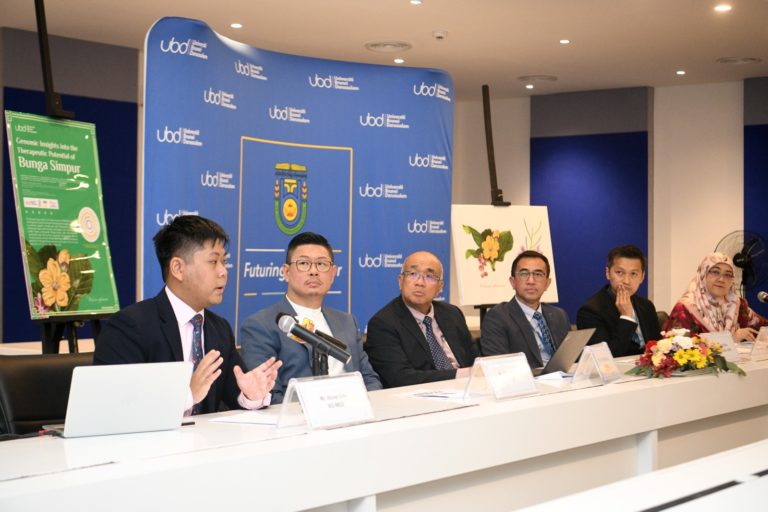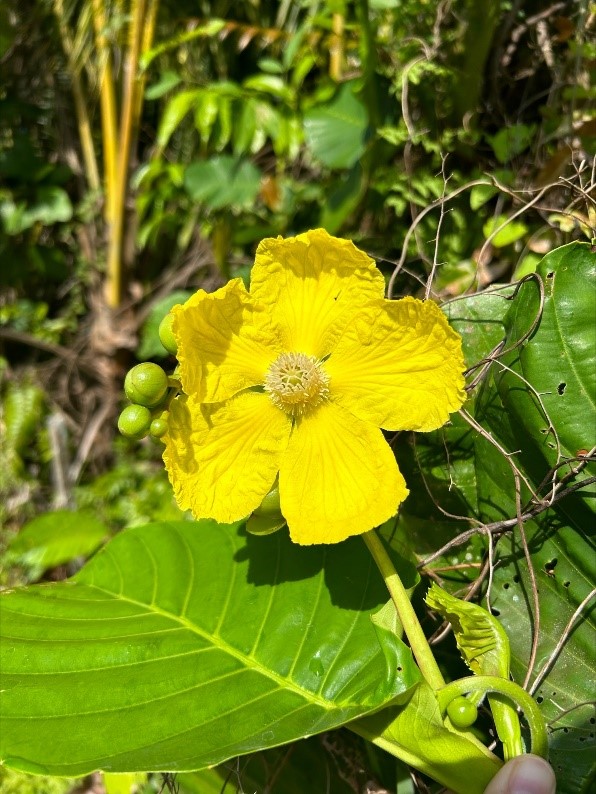Brunei and Singapore Research Team Unveil The Genome of Brunei Darussalam's National Flower, Bunga Simpur With Promising Anti-Cancer Therapeutic Properties

Researchers from the Institute for Biodiversity and Environmental Research (IBER) and the Faculty of Science, Universiti Brunei Darussalam (UBD), together with researchers from SingHealth Duke-NUS Institute of Biodiversity Medicine (BD-MED), have successfully mapped the world’s first genome of Bunga Simpur (Dillenia suffruticosa), Brunei Darussalam’s national flower. The study findings of Bunga Simpur were presented to His Majesty Sultan Haji Hassanal Bolkiah Mu’izzaddin Waddaulah ibni Al-Marhum Sultan Haji Omar ‘Ali Saifuddien Sa’adul Khairi Waddien, Sultan and Yang Di-Pertuan of Brunei Darussalam, Chancellor, Universiti Brunei Darussalam during the 35th Universiti Brunei Darussalam convocation ceremony on 21st August 2023.
Cultural and Ecological Significance of Bunga Simpur
In Brunei’s secondary or cleared forests, Dillenia suffruticosa, or Simpur Bini, stands out for its large penni-veined leaves, bright yellow flowers, and pink star-shaped ‘fruits’. This species is significant in Brunei Darussalam’s local culture and the regional forest ecosystem.
Traditionally, the plant’s robust leaves have been used to ferment culinary staples such as rice, creating the dish known as ‘tapai’, and soybeans to create ‘tempeh’. Beyond their culinary uses, these leaves have long been a natural remedy in the local populace’s repertoire, for healing minor cuts, reducing inflammation, and providing relief from itching.

Key Findings on the Genome and Therapeutic Properties
The researchers from both institutes extracted DNA from Bunga Simpur which was grown in the gardens of the Universiti Brunei Darussalam Botanical Research Centre. Using advanced genomic sequencing technologies and data analytics, the complete DNA map or genome of Bunga Simpur was pieced together. The genome was found to contain 34,195 genes, which is 1.5 times more than the human genome.
The researchers also found that the Bunga Simpur genome could potentially produce organic compounds with therapeutic properties. Chemical profiling of the Bunga Simpur extracts using mass spectrometry found the flower abundant in terpenoid and flavonoid compounds, some of which through other scientific studies, show therapeutic properties with promising anticancer activities on cancer cell lines.
Bunga Simpur profiling has unveiled some potential commercialization avenues. Beyond its promising anti-cancer properties, therapeutic compounds from Bunga Simpur also have anti-inflammatory and anti-microbial evidence based on previous literature. With further studies, these agents from the Bunga Simpur extracts can be harnessed to develop potential wound care products, cosmeceuticals, and nutraceuticals formulations. Such innovations could provide both preventive health benefits and pathways. While these anti-cancer results are encouraging, comprehensive research is crucial to fully tap into Bunga Simpur’s commercialization potential.
Commitment to Biodiversity Research
UBD places biodiversity research as one of its main research thrusts and the IBER functions as the focal agency in the university’s systematic organisation and enhancement of biodiversity and environmental knowledge through its research, education, and outreach programmes. The main focus areas under IBER include research conducted under its permanent plots network, research in tropical ecology, biodiversity and conservation, ecosystem studies and applied research. It is through the various research activities that IBER is guiding the restoration and conservation strategies of these valuable biodiversity assets in line with Sustainable Development Goals.
Ongoing Collaboration
UBD has provided significant support for researchers to conduct studies on biodiversity and environmental research with both local and international institutions and organizations. IBER is currently collaborating with BD-MED on several research projects related to biodiversity genomics with a goal to understand the genomic profile of the flora and fauna of Brunei. The Bunga Simpur genome project is part of the initiative to investigate the many species of Brunei’s unique flora in IBER’s future research. From the current findings of Bunga Simpur genome, the collaborative research team plans to further the study to expand and evaluate the therapeutic compounds found in Bunga Simpur. This project is also conducted in collaboration with Brunei Forestry Department, Ministry of Primary Resources and Tourism and supported by Brunei Darussalam’s Department of Agriculture and Agrifood, Ministry of Primary Resources and Tourism.
IBER UBD and BD-MED extend their heartfelt gratitude to the Government of His Majesty the Sultan and Yang Di-Pertuan of Negara Brunei Darussalam for the unwavering support and commitment to advancing research at UBD. This commitment and support have been instrumental in propelling scientific studies for the future.

